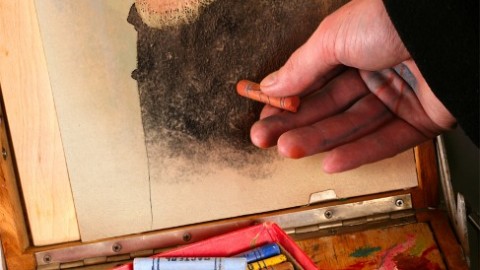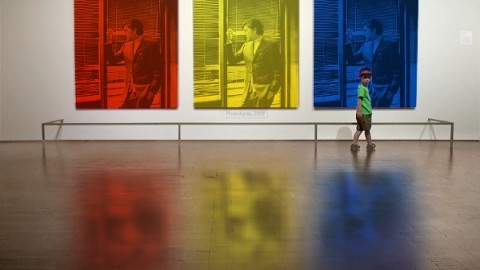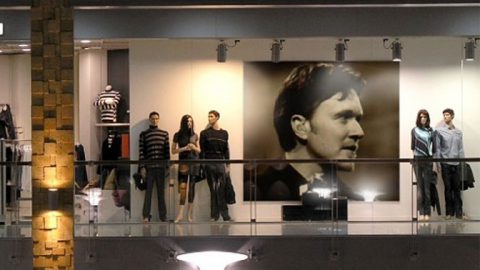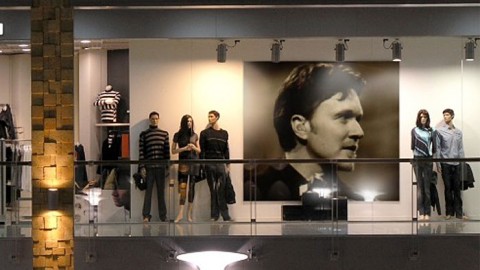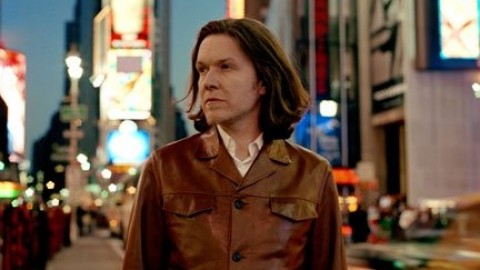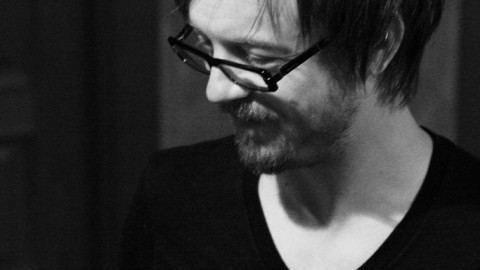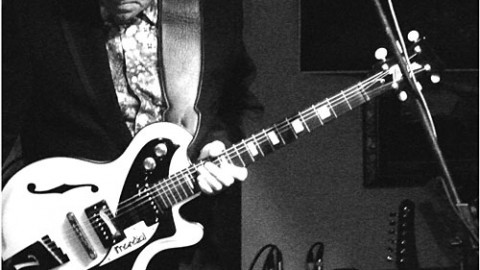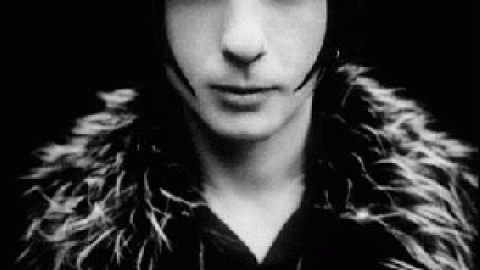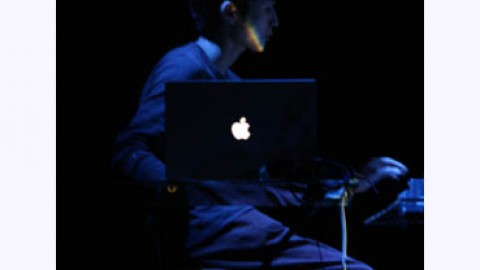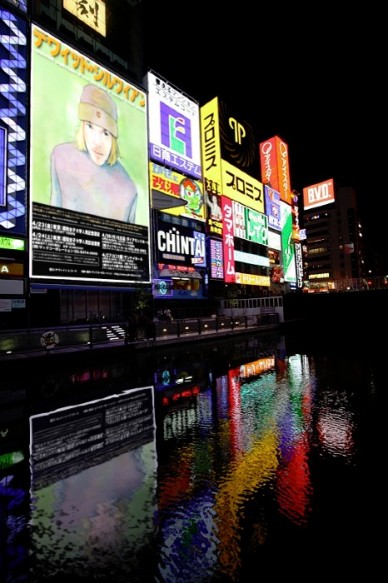
Trophies exclusive interview 2002 by G. Hillebrand
Q&A02 2002 Gerrit Hillebrand (September 2002).
This is the second exclusive QA session of trophies.org with David Sylvian. This time, the questions were submitted by the readers and where possible combined. A big selection of about 80 from the 220 submitted questions have been answered by David. Quite a few questions are in fact referring to the same subject or overlap each other, therefor you can find more than one name of questionnaires at a particular question. There will be no correspondence about reasons for questions not being answered by David.
We start with part 1.“Before I start let me thank all of you who participated in the E+N tours. Your warmth and generosity overwhelmed us.”
David Sylvian, september 2002.
Tour
Please tell us about the tune “Bhajan”, the occasional encore on the last tour. (question by Terry Kalka)
DS: I wrote Bhajan in 97 after my first meeting with the Indian saint Shree Maa. A number of devotional songs and poems were written at that time some of which were printed in Trophies II, other pieces have yet to be performed or recorded.
How come nothing from Gone To Earth made it to the playlist this year? Songs such as “Pulling Punches” and “Silver Moon” have never had their day in your live perfor-mances. What can you tell us about these songs from a live performer’s point of view? (question by Gen, fgb)
DS: I did perform Pulling Punches as an occasional encore on the Slow Fire tour and funnily enough I take out and brush off silver moon during most tour rehearsals. Its simply a case of finding a suitable home with the right band, arrangement, and set list. I havent given up on it yet! Pulling Punches is a whole other kettle of fish! Its a little harder for me to get to grips with that one after all this time. I like the song but I guess I out grew it long ago. But who knows? Its possible to rekindle interest in material you long thought beyond your emotional reach.
Did you and Steve write any new songs on the tour? (question by Goran Persson)
DS: I dont write on the road. I may be wrong but I dont believe Steve does either.
As I am sure you are aware, fans trade live recordings of your shows. What is your opinion about this?
DS: Let me just say that on a personal level I dislike spotting all the digicam recording lights in the audience on any given night. Its often the case of an individual acquiring the raw material for their product to turn a profit. This behavior is parasitical, exploitative, and grossly unfair. Fans trading personal copies without profit is another matter. Its difficult for me to appreciate the necessity of these exchanges but essentially I dont have a problem with it. Is it another case of, we have the technology, we have the media, why not use it? Document, record, file away? Information as a substitute for experience? Are they intended for the collectors, the trainspotters, the absentees? Do those that purchase these bootlegs repeatedly listen to them? Im curious!
One of the things I like about the live experience is its ephemeral nature. We share in something together, set time and place. What we take away from it at the end of the evening is different for all of us. There isnt necessarily meant to be, for want of a better word, a material product resulting from the performance. Live performance shares this characteristic with the Theatre. What we experience as an actual event in our lives, how we digest that experience and carry it with us until it all but fades in significance or from memory is of far greater importance than the sum of its parts. Holding on to these, often poorly recorded, bootlegs, it seems to me, is a form of attachment. The result of not wanting a particular experience to end (fear of death?). Artificially prolonging the life of the experience. Generally, I prefer to let it go (although there are exceptions), unless the artist in question feels it relevant to release a live recording. But even then you could put up a convincing argument that great live albums are few and far between especially outside of the context of Jazz.
It has been said that you record the shows yourself (i.e. supposedly all of the Slow Fire dates were recorded?). Artists like Pearl Jam and Dave Matthews have begun to release the archives of their live shows for commercial purposes. Will you do so or will this depend on the label with which you work? Or do you think it would be overkill to do so?
DS: Most of the Slow Fire dates were recorded for personal documentation but I have no intention of releasing them at present. Many artists are releasing numerous live recordings in an attempt to regain control over their work, remove it from the hands of the bootleggers. It makes sense. I have no desire to release material as a counter attack, as a defense mechanism, rather than an artistic necessity.
Do you think a live record of IPoS, Slowfire or E&N tour will be published in the near future?
DS: I dont think so. The idea was kicked around by friends at Virgin a short time ago but I feel Ive spent way too much time pouring over the past and simply want to move on.
During the Japan days you made no secret of your dislike of touring, saying it was unproductive and not creatively fulfilling. You seem to enjoy touring more these days – what changed your mind? (question by Paul Jeff)
DS: Short answer, working with Robert. The strength of that collaboration was explored in the live context rather than in the studio. Ive spoken about this on numerous occasions. Robert brought a degree of commitment to each and every performance that made an impression upon me. I opened up to the communal/shared experience I touched on above. I relaxed into my role as performer/conduit. Rather than viewing the experience as unproductive and not creatively fulfilling which, no doubt, it can potentially be, I began to enjoy the challenge of immersing myself in the work night after night. Pulling as much out of the material as was available to me.
Are you planning to work in the studio with the E&N touring band? (question by Milla)
DS: Not in its entirety, no.
Have you ever considered doing an unplugged concert? (question by Simon Basten)
DS: Well you couldnt get much more unplugged than the Slow Fire tour. But outside of that, no, havent given the matter much thought. I keep my options open. If all the signs lead towards a certain path I take it. Its an intuitive journey which I try to navigate with a little discrimination.
Any plans to tour again soon? (question by Jeremy Cole)
DS: I intend to spend time writing and recording. The prospect of touring again is, for me, an unusually exciting and pleasurable possibility but, having just completed two short tours, it doesnt take precedence over my other interests. On a number of levels I consider touring as something of a luxury. It isnt an essential part of my life (although it could always become one) but something I enjoy committing to when time and circumstances allow.
Releases
Both “Camphor” and “Damage” were excellent, with great remastered sound. A very small gripe re “Damage”…why did you take off “Darshan” and replace it with “Jean the Birdman”? Couldn’t you have just added “Jean the Birdman” instead? (question by (Danny)
DS: I wasnt happy with the performance of Darshan. I tried to make the strongest album I could with the material available to me. As is so often the case it proved to be a matter of quality over quantity.
What did you made decide, not to include Blue Of Noon on the Camphor album? (question by Gerrit Hillebrand)
DS: Blue of Noon was never a finished piece as far as I was concerned (it was originally a song in fact). I felt it needed work to help it stand on its own feet. However, budget constraints for Camphor didnt allow for too much recording work to be undertaken.
To me, it sounds like Dead Bees on a Cake has a more distinct overall sound than your earlier albums. Have you intentionally worked on creating a specific atmosphere for the album as a whole? (question by Christian Gormsen)
DS: To be honest thats attempted on most projects no matter how diverse the content might be. With Dead bees.. I remained in total control of the work from beginning to end which enabled me to carry that vision through somewhat convincingly.
In ‘I Surrender’, your lyrics say, “I looked back and glimpsed the outline of a boy/My life of sorrow is now collapsing into joy”. Is this about you, and did you have a “life of sorrow” growing up? (question by Lily)
DS: Yes, the song refers to my own experiences. I wouldnt want to overstate the case or magnify these things out of all proportion. Sorrow? Yes, god yes.but its all relative isnt it?
To my mind your strongest songs and vocal performances to date were the tracks Endgame and Earthbound. Have you written any more pieces of this nature? (question by Simon Purdon)
DS: These pieces were written after the completion of the Rain Tree Crow project. Lyrically theres still this connection with that earlier material. I guess I hadnt worked the themes out of my system entirely with RTC. There were a series of songs written at that time. Jean the Birdman was part of that series. Ultimately I found much of the material unconvincing and abandoned it.
Improvisation, the capturing of a moment seems very important in your work. So why go back and redo vocals etc. like on the Everything and Nothing collection? (question by Chris Buckingham)
DS: Improvisation plays a part in my work but is by no means the most important element. I guess its importance varies depending on the given project in question. It played a larger role in the work I did with Holger, RTC, and to a lesser extent with Robert. It continues to influence the writing and recording of the work I do today but Im no purist. For me its a case of any means necessary to bring the work alive.
As for the case of the new vocals on the older material this is another issue entirely. Again, this is something Ive talked about at length elsewhere. The issue for me was a) how to create continuity on a compilation that spans 20 odd years? b) How to make the work a complete entity in itself and not merely a reference work and c) how to keep myself interested in a work that was entirely retrospective?
As author of the material I think of it as my right to rework my own recorded output whenever the desire should arise (of course that desire isnt likely to arise often, if ever, again). Now that Im no longer with Virgin records ( they being sole owners of the material, which of course is criminal), Im unlikely ever to have unlimited access to it again, another reason for immersing myself in these projects when I did. I was surprised that some people had a problem with this approach from its inception. Dave Kent and I felt convinced it was a valid approach to take and those close to me began to feel the same way once they heard the work coming from the studio. After all, as performers, were constantly reinterpreting the work night after night, year in year out. The original recordings still exist, are still available, so essentially nothing is lost. Ghosts is often singled out as the track which caused the most conflict among listeners and critics. Let me just say that for my part I was never happy with the original performance I gave. That it was recorded under considerable duress with no time for reflection (the vocal track was completed the day the track itself was mixed and the album sequenced. The following morning we mastered the record). For some this mayve brought something out in the original that works for them. For others its a case of nostalgia, theyd rather I wasnt fooling around with their memories (Im not personally an advocate of music-as-nostalgia although I fully appreciate others are). Others criticised the act as one of vanity. It was such a simple and honest decision as far as I was concerned. I dug deep to clarify my motivations and intentions and havent regretted my decision.
Dave Kent has been with you for some time now. What makes your professional relationship with him work so well? (question by Steve Horne)
DS: Good question! Dave has enormous patience (a necessary quality for anyone working with me), a wealth of technical know how (he has built and re-built studios for me over the years and this last year weve built one more-or-less from the ground up). Hes very discreet, (to the point where its possible to forget he is actually present in the room. Trust me, this is an excellent quality for an engineer to have), generous with his talent and time, gives 100% of himself to everything we do together.
Is there any particular song you wish you could have made a video for but did not get the chance to and how involved were you with the videos you did make? (question by “ps”)
DS: I’d have loved to have made a video for I surrender because I so wanted to explore the core subject matter of that piece visually.
I tried to get involved with the videos as much as possible. I worked closely and had a good rapport with Anton Corbijn and Nigel Grierson. At some point Virgin Records decided that as TV companies werent showing these predominantly b/w images they wouldnt further fund working with these wonderful collaborators. Disappointing from my standpoint but understandable from a commercial one. An open dialogue regarding the issues wouldve allowed for creative solutions rather than a blacklisting of sorts. Another real problem was the alternatives Virgin would come up with at the nth hour. Theyd often request a video be delivered to their desks within two or three days of the initial call. A rush job based on initial sales of a particular single (we tried to preempt this approach on many occasions but to no avail). Theyd supply directors, producers, whod scramble to pull something together within the minimal budgets and inadequate time frames. These videos I had little involvement in (Pulling Punches, Silver Moon, Jean the Birdman).
Answered Prayers and Healing Place as on Camphor sound much faster and a whole tone higher than on Gone to Earth. (The remix of “Wave”, also taken from the Gone To Earth tapes, was remixed at the same speed as the original).
Was it an error on the two-track masters you were sent from Virgin UK, or did you actually decide on that for reasons of tonal continuity within the album flow?
(question by Nada Jakovcic, Henk L. Kamps, Ian Ring)
DS: I can only put the problem down to the numerous transfers the material had to make before it reached me. No, this was certainly not intentional. Apologies for the error. Well spotted one and all.
The remixed detail from ‘Mutability’ worked very well, as it appears on the Camphor bonus disc. Have you remixed the whole of this piece? (question by Huw)
DS: Thank you. No, I didnt remix the entire piece.
“Ride” was spliced out of “Secrets of the Beehive” because of time considerations but included on “E+N”. It becomes by far and away everyone’s favourite (a staggering 25.2% of the votes) on that album. Maybe there is the surprise element of a song not heard before that delighted us fans. But to me there is something else at work here, “Ride” is the most beautifully constructed song I have ever heard – like fast travel- tension build-up, hiatus, release – a stunning, complex masterpiece.
The questions are :
– Here’s a left-over song “beating” all others of your oeuvre. Does our reaction (voting) surprise you?
DS: No. It was my favorite also. I was crushed when I wasnt able to finish it first time around due to time and budget constraints.
– If you don’t instinctively think of this song (or any other for that matter) as a masterpiece will you judge “Ride” differently now given our reaction to it ?
DS: I can only respond intimately to my own work. It could be argued that there are pieces I believe to be amongst my strongest which get little or no public attention. This can have little impact on my thoughts, feelings, or regard for the work. Having said that Im grateful that ANY of the material finds a home in the hearts of others.
– Will “Ride”, as rumour has it, re-emerge (it’s rightful place?) on a re-mastered “Secrets” ? (question by Chris Tupper, Danny, Renzo Pietrolungo)
DS: This matter is now out of my hands.
Having been involved with the Shadowplay tribute project, I understand that Martin Bostock sent you a copy of the CD. What did you think of your fans interpretations of your music? Were there any par-ticualr versions of your songs that you enjoyed? And, how do you feel about people covering your songs? (question by “Mr.X”)
DS: To be honest Ive yet to hear the CD (sorry). I am in general very interested in hearing how others interpret the material

